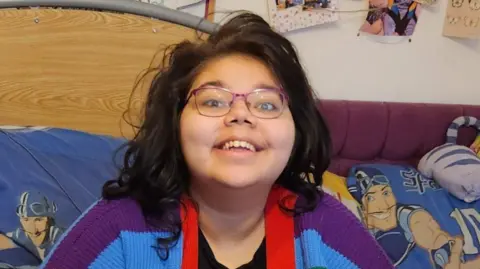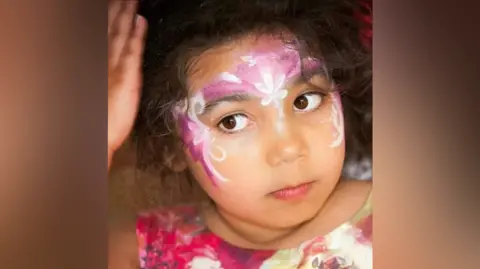'My child fell through every care loophole'
 Beverley Williams
Beverley WilliamsA mother who says her disabled child "fell through every care loophole" is trying to give her daughter the dignity in death she did not have in life.
Beverley Williams said her daughter Amira, from Newcastle, faced delays to her education for 10 years and was effectively "trapped in her room" waiting for home adaptations, which only began a month before she died, aged 17.
She is now raising funds for Amira's headstone, as a "lasting tribute to a precious life".
Newcastle City Council said: "We will learn from the delays in providing Amira with the support she deserved and want to say sorry that home improvements weren't complete earlier."
Amira had complex learning and physical disabilities and failings in her hospital, educational and social care had been a "perfect storm", Ms Williams said.
"Every single one of them thought someone else would deal with it. Every one of them passed the buck on to someone else.
"I wish her life could have been happier, because she didn't have very long."
'Where's the dignity?'
Ms Williams said Amira loved anything alternative and groups where she would not be seen as different.
"If she'd seen anyone that was dressed even just slightly alternatively, she made a beeline to stop to them and say 'you look beautiful, I love the way you look'."
She had learning difficulties, autism and ADHD and then in 2019 she developed Guillain-Barre syndrome, a rare nerve condition which paralysed the bottom half of her body.
A delay in home adaptations meant Amira was forced to stay in nappies for five years, despite being continent, Ms Williams said.
She would throw herself on the ground and crawl using her elbows because they could not get the wheelchair through the door.
Ms Williams said: "Where's the dignity doing that to a 17-year-old girl?"
The local authority said works were delayed "because of processes based on national guidance".
The council's director of children and families Cath McEvoy Carr said: "We regret that home improvements weren't made earlier, as we know the positive impact it would have had on Amira's quality of life."
 Beverley Williams
Beverley WilliamsFrom the age of seven, Amira was meant to be home-schooled after she experienced difficulties with mainstream and special needs schools, but delayed council arrangements fell through multiple times, Ms Williams said.
She was out of education for the best part of 10 years.
Ms Williams questioned why attempting to get basic provision had been a fight.
"Unfortunately, when you talk to other parents with special needs, they often feel the same way," she said.
"There's no one to guide you through it. There's no one to help you," Ms Williams said of Amira's special needs provision.
Hospital investigation
In 2024, Amira was admitted to the Royal Victoria Infirmary initially for a B12 deficiency, and then for subsequent infections.
She had to be sedated for days for her treatments.
Two hours after she was brought back round, she was sent home.
And a few hours after that, she died.
An inquest into Amira's death concluded it was due to "natural causes contributed to by premature discharge from ICU", following a medical episode of organ support in intensive care.
Newcastle upon Tyne Hospitals NHS Foundation Trust said: "All staff were focused on trying to do what they felt was right at the time for her but with review and hindsight, there are things we could have done differently."
It said an investigation had been carried out and actions put in place, including developing new discharge protocols.
Helping grieving families
Ms Williams said this "can't happen to someone else".
She is now hoping to start a charity providing headstones for grieving families after she was quoted between £12,000 and £16,000 for one.
A phrase her grandmother had used - "you don't want a pauper's grave" - had stuck with her through her grief, Ms Williams said.
She said: "It's an awful thought, and it's an awful feeling to think how will I pay for my child's headstone?
"It's not something any parent should have to think of, but it's a reality for some of us."
Ms Williams had to quit work to care for Amira, and does not have the funds to pay for one herself.
"I can't live in grief," she said.
"And the only way I can think to get through it is to help other people."
